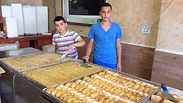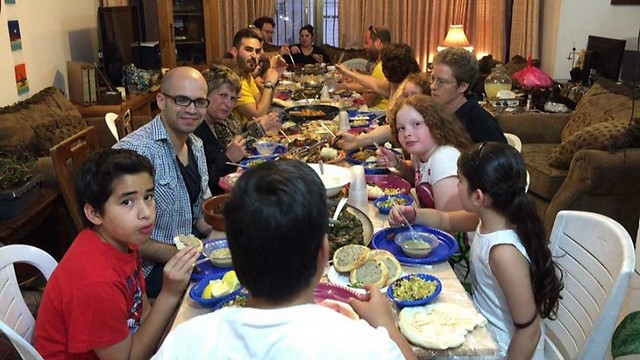
Muslims, Jews hold joint iftar meals for Ramadan fast
Jewish families hosted by Palestinian families for post-fast meal; 'I wanted to share the good precious holy moments of Ramadan with other people,' says Arab woman hosting Jews for iftar.
As the call to prayer marking the end of the day-long Ramadan fast echoed from a nearby mosque, the two dozen people sat down and began eating. There were many traditional Arab foods, and conversation flowed easily. It looked like any post-fasting dinner table in the Arab world.
What was unique here is that most of the guests had never met the hosts, Bronka and Aref Tahboub, before this night. The Tahboubs had opened their home to a group of Israeli Jews who wanted to experience the iftar meal.
“There are so many things here that we don’t control,” Aref told The Media Line in fluent Hebrew. “But Arabs and Jews have to live together. I’ve worked with Jews all my life and I want my children to get to know Jews.”

The meeting was organized by Kids4Peace, a grassroots organization that brings Muslim, Christian and Jewish children in Jerusalem together. About 25 Jewish families signed up to be hosted by Palestinian families, along with their children.
The Tahboubs have three children, two boys, age 14 and 11, and a daughter who is 9, and all three children are fasting. While it is only compulsory to fast from puberty, many children choose to start earlier.
“They see all of their neighbors fasting, and they want to do it too,” Bronka, an English teacher told The Media Line. “Ramadan is a special time for us. We believe that the gates of hell are closed, and the sky opens the doors to our prayers.”
Ramadan also marks the time that Muslims believe Allah revealed the Qur’an to the Prophet Mohammed, who was illiterate. As it based on the solar calendar, rather than the lunar calendar, it rotates through the seasons. Muslims fast from dawn to dusk. Mohammed used to break his fast with a date, and Muslims today do the same.
At the Tahboubs in the upscale East Jerusalem neighborhood of Beit Hanina, the Jewish guests quickly feel at home.
“It starts with me being a citizen of Jerusalem,” Duel Peli, a lawyer whose daughter attends Kids4Peace told The Media Line. “Jerusalem is a mixed city with people from different ethnic origins and different nationalities. I live in this city I want to be friendly with as many of the different populations as I can.”
He says that being part of Kids4Peace, which divides the children into groups of one-third Jewish, one-third Christian and one-third Muslim, has been an eye-opening experience for him. The parents have parallel workshops to the children, who go to summer camp together in the US.
“I find myself in the minority which is an important feeling for me to have,” he said. “It makes me understand what it is like to be a minority in Jerusalem and in Israel.”
The population in Jerusalem is two-thirds Jewish and one-third Arab, divided between Muslims and Christians. The meetings have continued despite more than a year of tensions in Jerusalem, which began last June when Hamas terrorists kidnapped and killed three Israeli teenagers in the West Bank. Jewish extremists then kidnapped a Palestinian boy, Mohammed Abu Khdeir, from Shuafat, a neighborhood less than a mile from Beit Hanina. Bronka Tahboub says she knows Mohammed’s father well, and visited him after his son was killed.
His death, and the fighting between Israel and Hamas last summer in Gaza, during which several rockets were fired toward Jerusalem, has negatively affected her nine-year-old daughter Leen, who for the past year has refused to sleep in her own bed.
Yet Bronka says the tensions have only strengthened her resolve to reach out to her Jewish neighbors.
“When God created us He didn’t say 'You’re a Muslim, you’re a Christian, you’re a Jew',” she said. “We are all humans and I wanted to share the good precious holy moments of Ramadan with other people. Everyone has a different view and perspective we need to share it together to remove the anger and the sadness in the area.”
After dinner, as the kids played soccer outside, Bronka took out a water pipe and began puffing on melon and mint scented tobacco. As the water pipe made its rounds, the tensions in Jerusalem between Arabs and Jews seemed far away.
Article written by Linda Gradstein
Reprinted with permission from The Media Line










